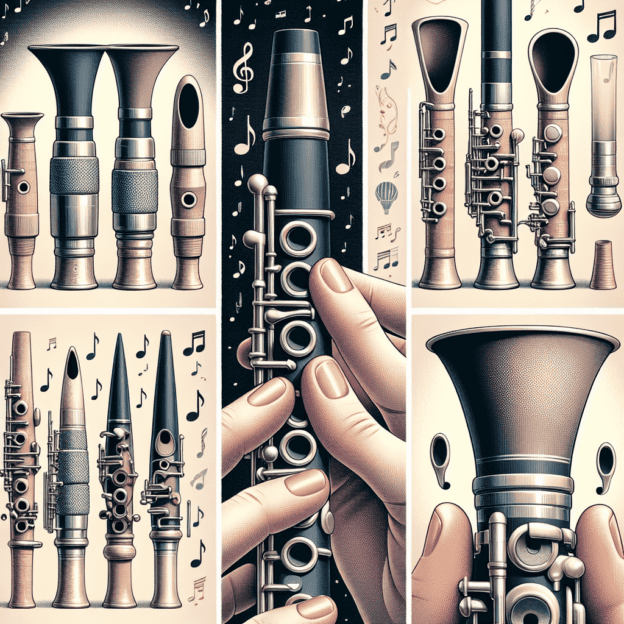Choosing the right mouthpiece for your clarinet is a key step in developing your unique sound and enhancing your overall playing experience. The mouthpiece, being a crucial part of your instrument, influences everything from tone quality to intonation and comfort. For both beginners and seasoned players, understanding how to select a mouthpiece can significantly improve your performance. This guide will help you navigate the process of clarinet mouthpiece selection, empowering you to make well-informed choices.
Understanding Mouthpiece Basics
The clarinet mouthpiece is where you connect with your instrument, playing a key role in sound production. Mouthpieces come in various materials, most commonly hard rubber, plastic, or metal. Each material offers distinct characteristics and tonal qualities, affecting both the sound and feel of your playing.
The Anatomy of the Mouthpiece
To choose the right mouthpiece, it's important to understand its parts:
| Component | Description | Impact |
|---|---|---|
| Cup Shape | Internal shape of the mouthpiece | Wider cup = darker sound Narrower cup = brighter, focused tone |
| Bite Plate | Where bottom lip rests | Affects embouchure stability |
| Facing Length | Distance from tip to reed seat | Shorter = brighter sound, easier articulation Longer = warmer tone, more control |
| Tip Opening | Space between mouthpiece tip and reed | Wider = bolder sound, more air needed Tighter = easier control for beginners |
Choosing the Right Material
The mouthpiece material can greatly impact your playing experience:
- Hard Rubber: Popular for its balance of warmth and projection. Offers smooth tone and good response across registers.
- Plastic: More affordable and durable. Resistant to temperature changes, making it suitable for students and beginners.
- Metal: Less common, produces a bright and piercing sound. Suits specialized playing styles or unique preferences.
Determining the Right Shape and Size
Consider your playing style and preferences when selecting a mouthpiece:
- Playing Style: Classical music players might prefer mouthpieces that offer more warmth and subtlety. Jazz players often choose mouthpieces that emphasize brightness and responsiveness.
- Familiarity: Try various options before making a decision. Pay attention to what feels comfortable and produces a sound you like. Voicing your thoughts during testing can help identify the best fit.
Testing Mouthpieces
Hands-on testing is crucial for choosing the right mouthpiece:
- Local Music Stores: Visit nearby music shops and ask to try different mouthpieces on your clarinet.
- Seek Expert Opinions: Ask your clarinet teacher or professional players for their thoughts on specific mouthpieces.
- Record Your Tests: Make short recordings of your playing with each mouthpiece. Comparing these will help you determine which one suits your musical style best.
Maintaining Your Mouthpiece
Proper care extends the life and performance of your mouthpiece:
- Regular Cleaning: After each use, clean the mouthpiece with warm, soapy water and a soft brush. Remove all residue to maintain hygiene.
- Check for Damage: Regularly inspect your mouthpiece for cracks or chips that could affect your sound.
- Proper Storage: Keep your mouthpiece in a protective case when not in use to prevent damage and maintain its condition.
The Impact of Quality Instruments
While your mouthpiece choice is important, remember it works together with your clarinet's quality. Renowned brands like Martin Freres craft clarinets that enhance every aspect of playing. A well-made clarinet paired with a high-quality mouthpiece creates a rich, resonant sound, allowing you to fully express your musical ideas.
Exploring different mouthpieces and maintaining a quality instrument can greatly improve your playing. As you refine your sound, consider investing in a mouthpiece that complements your clarinet's craftsmanship.
Enhancing Your Musical Journey
Selecting a clarinet mouthpiece is a personal process and a key part of developing your unique musical voice. Engage actively with your choices and let your explorations guide your playing. Each mouthpiece influences how you express yourself through music and shapes your experience as a clarinetist.
As you try different mouthpieces and care for your instrument, enjoy discovering what aligns with your musical vision. Finding the perfect mouthpiece takes curiosity, patience, and a genuine passion for playing the clarinet.
Table of Contents
- Understanding Mouthpiece Basics
- The Anatomy of the Mouthpiece
- Choosing the Right Material
- Determining the Right Shape and Size
- Testing Mouthpieces
- Maintaining Your Mouthpiece
- The Impact of Quality Instruments
- Enhancing Your Musical Journey







